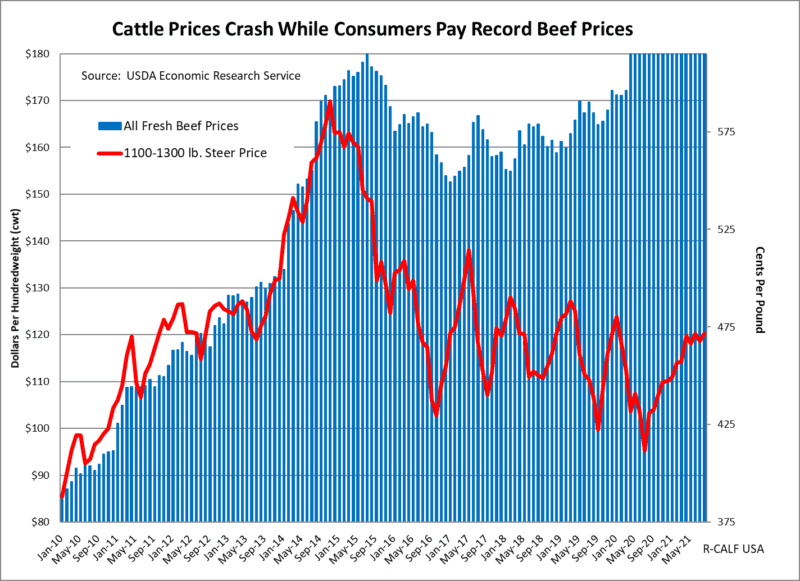Brett Crosby currently serves as Region IV Director for the U.S. Cattlemen’s Association, representing Utah, Wyoming, and Colorado. He taps into the current trends in the beef market from a producer side, and I couldn’t have said it any better than he has in his opinion piece in Northern Ag Network. Here’s Brett: A blog post published by the U.S. Chamber of Commerce on July 12, 2022, claimed that Congress is “rushing” to consider “aggressive legislation to regulate beef markets.” Boy, if only that were true. In February 2020, the U.S. Cattlemen’s Association (USCA) hosted its annual Cattle Producer’s Forum at the Public Auction Yards in Billings, Montana. It was there that a group of producers discussed the idea of reigniting a concept
Topics:
Michael Smith considers the following as important: Cattle, Featured Stories, Food inflation, US/Global Economics
This could be interesting, too:
Ken Melvin writes A Developed Taste
Joel Eissenberg writes How Tesla makes money
Angry Bear writes True pricing: effects on competition
Angry Bear writes The paradox of economic competition
Brett Crosby currently serves as Region IV Director for the U.S. Cattlemen’s Association, representing Utah, Wyoming, and Colorado. He taps into the current trends in the beef market from a producer side, and I couldn’t have said it any better than he has in his opinion piece in Northern Ag Network. Here’s Brett:
A blog post published by the U.S. Chamber of Commerce on July 12, 2022, claimed that Congress is “rushing” to consider “aggressive legislation to regulate beef markets.”
Boy, if only that were true.
In February 2020, the U.S. Cattlemen’s Association (USCA) hosted its annual Cattle Producer’s Forum at the Public Auction Yards in Billings, Montana. It was there that a group of producers discussed the idea of reigniting a concept previously advanced by Senator Chuck Grassley of Iowa to improve the cash cattle market.
That concept was introduced by Iowa’s senior senator in 2002 as the Transparency for Independent Livestock Producers Act. It would require 25 percent of a packer’s daily kill to come as a result of purchases made on the daily, open market or spot market.
That was 20 years ago.
Since that time, we’ve seen a 75% decrease in the number of cattle feedlots – from 55,472 in 2002 to 13,379 in 2017 according to U.S. Census of Agriculture data. We’ve also lost approximately 1,200 cow-calf producers and backgrounders each year.
“Rushing” into legislation? While we continue to hem and haw over whether or not bold Congressional action is needed, independent producers will exit the business.
From an outsider’s view, it can certainly seem like all this talk of consolidation and anticompetitive practices in the U.S. beef and cattle industries suddenly sprung up. But USCA and other stakeholders have worked towards restoring leverage and true price discovery in the cattle marketplace for decades. Congressional passage of the Cattle Price Discovery and Transparency Act and the Meat and Poultry Special Investigator Act represents a significant step toward achieving that goal.

In testimony to the U.S. Senate Committee on Agriculture, Nutrition, and Forestry, Dr. Stephen Koontz of Colorado State University observed that, “There are no other industries outside of cattle and beef…that work in their entirety in this type of setting – whereby supply decisions, demand revelation, and changing the product form are in distinctly different industries. Coordinating the system is difficult.”
“Difficult” is certainly understated, but the point remains: The U.S. cattle and beef industries’ marketing process and dynamics are entirely unique. In our business, we need a referee to ensure a competitive playing field free from interference. We also need a healthy and viable cash market to keep our independent producers in business.
Not many have accused Congress of moving too quickly. Democracy is designed to be a slow, laborious process. Momentum for these two historic pieces of legislation grew over nearly two years from an idea conceived by a small group of concerned producers to widespread support from producers and consumers, grassroots organizations, Members of Congress, and the White House. Now it’s time to finish what Senator Grassley began twenty years ago: Set aside the interests of multinational meatpackers and secure the future of our sovereign food
